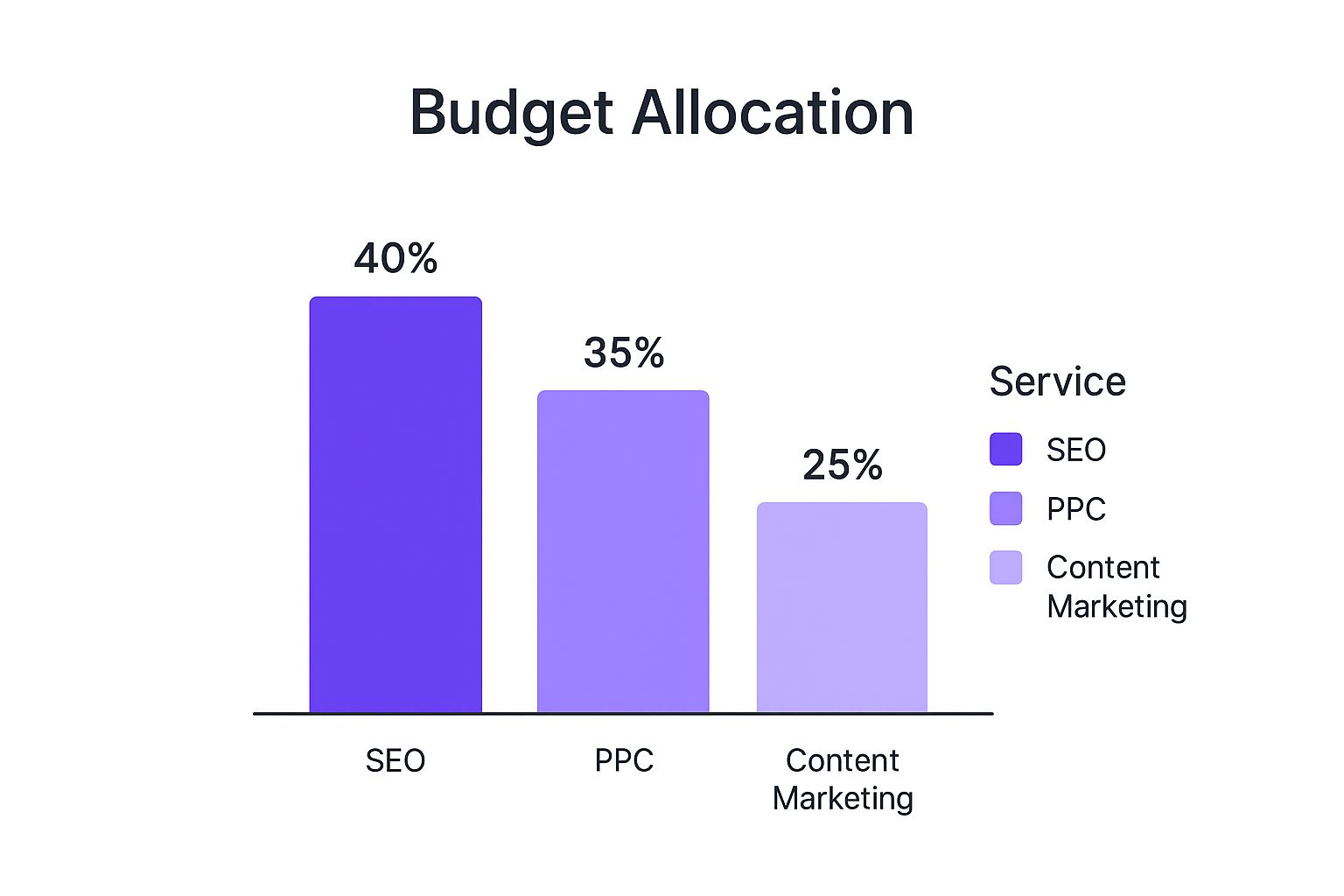How to Choose a Digital Marketing Agency That Fits Your Business
Choosing the right digital marketing agency doesn’t start with their portfolio—it starts with your homework. Before you even Google a single agency, you need to get brutally honest about what success looks like for your business, who you’re trying to reach, and what you can realistically spend. This prep work is the difference between hiring a true growth partner and just another vendor.
Defining What You Actually Need from an Agency
Walking into an agency pitch without clear goals is like hopping in a cab and saying, “Just drive.” Vague wishes like "more traffic" or "a better social media presence" are guaranteed to lead you nowhere fast. The most critical first step is to look inward and figure out your destination.
This all starts by turning your big-picture business objectives into sharp, measurable marketing goals. If your ultimate aim is to boost sales, what marketing metric actually gets you there? Giving a potential partner a concrete target to aim for is non-negotiable.
From Vague Ideas to Tangible Goals
Stop saying you want "more leads." That's not a goal; it's a hope.
A much stronger, more actionable goal sounds like this: "Increase marketing qualified leads (MQLs) from organic search by 20% within the next six months." Now that tells an agency exactly what victory looks like and how you'll be keeping score.
Here’s how you can frame your needs to get real results:
- For Brand Awareness: "Increase our share of voice in the [Your Industry] space by 15% over the next year."
- For Lead Generation: "Generate 50 new demo requests per month from our PPC campaigns with a cost per acquisition under $150."
- For E-commerce Sales: "Boost our online store's conversion rate by 1% and hit a 4:1 return on ad spend (ROAS) in Q3."
This is the level of detail that separates the pros from the amateurs. It becomes the foundation of your request for proposal (RFP) and gives you a clear yardstick to measure every agency against.
Set a Realistic Budget
Let's talk money. Your budget sets the entire scope of the engagement, so don't be shy about it. Being upfront with what you can invest allows agencies to propose strategies that are actually achievable, not just pie-in-the-sky dreams. As you map out what you need, it's also a smart move to consider the merits of hiring a Fractional CMO versus using a traditional agency—you might find a better fit for your stage of growth.
The chart below gives you an idea of how a small business might allocate its marketing budget when it's focused on building a solid foundation.

This breakdown shows a healthy focus on long-term, organic growth through SEO and content, balanced with targeted paid campaigns for quicker wins. Knowing your own allocation helps you find an agency that specializes in the right areas. If you need to build out your plan from scratch, check out our guide on how to create a digital marketing strategy.
Key Takeaway: The best agency partnerships are built on a bedrock of clear, documented goals. The prep work you do internally is every bit as important as the agency's credentials. After all, an agency can only hit a target you've clearly defined.
Digging into an Agency’s Track Record and Culture

Alright, you’ve got your goals locked in. Now comes the fun part: finding an agency that’s actually walked the walk for businesses like yours. This isn’t about getting wowed by a slick website or a smooth sales pitch. It’s about doing your homework to see if they’re a genuine partner in the making or just another vendor.
A great agency’s website should be more than a digital brochure; it should be a library of proof. You’re looking for detailed case studies that show real business impact—think revenue growth or lead quality improvements, not just fuzzy vanity metrics.
Look Beyond the Highlight Reel
Anyone can cherry-pick their greatest hits. Your job is to find the stories that connect with your specific industry and the problems you’re trying to solve. Don't just scan for big numbers; look for the strategic thinking behind them.
As you review their work, ask yourself a few key questions:
- Do they get my world? Have they worked with other businesses in my space? Understanding the unique quirks and challenges of an industry is a massive advantage.
- Can they solve problems? Do their case studies clearly lay out the initial challenge, the strategy they deployed, and the tangible results they delivered?
- Are their metrics my metrics? Are the results they brag about—like a jump in traffic or engagement—directly tied to the business goals you’ve set for yourself?
Seeing real-world examples is the best way to gut-check an agency's claims. You can get a great sense of what success looks like by exploring case studies in digital marketing to see how a smart approach translates into actual wins.
Verify Their Reputation
Website testimonials are a nice start, but you need to go deeper for the unfiltered truth. Third-party review sites can give you a much rawer look at what past and current clients really think. A perfect five-star rating across the board is rare (and sometimes suspicious), so look for consistent themes in the feedback—both good and bad.
But the most powerful validation comes from a direct conversation. Don't be shy about asking for two or three recent client references. A confident agency will be happy to connect you. And yes, you absolutely need to call them.
Pro Tip: When you talk to a reference, go beyond "Were you happy with them?" Ask about the agency’s communication, proactivity, and problem-solving skills. My go-to question is, "What was it like when things didn't go according to plan?" How an agency handles a tough spot says a lot more than when everything is smooth sailing.
Assess the Vibe: Culture and Communication
Skills and experience are only half the battle. The other half is all about the cultural fit. You’re not just hiring a service provider; you’re bringing a strategic extension into your team. You need to be sure you can actually work well together.
Think about their communication style. Do they sound like a partner who’s genuinely invested in your growth, or do they sound like they're just checking boxes on a list of deliverables? This relationship is built on collaboration. A mismatch in communication or core values can sink the partnership before it even gets started.
For example, since social media influences 76% of purchasing decisions, you need an agency that can authentically capture your brand's voice—not just post generic content. A poor cultural fit often leads to tone-deaf marketing.
Ultimately, a strong track record gets an agency on your shortlist. But a great cultural fit is what creates a successful, long-term partnership that drives real results.
To keep everything organized, a simple checklist can be a lifesaver. It ensures you’re asking the same tough questions of every agency and comparing them apples-to-apples.
Agency Vetting Checklist
| Case Studies | Detailed, outcome-focused stories with clear ROI. Work in similar industries or with similar business challenges. | Vague results, vanity metrics (e.g., "impressions"), or only showing work from years ago. |
|---|---|---|
| Client References | Willingness to provide 2-3 recent, relevant contacts. Positive feedback on communication and problem-solving. | Hesitation to provide references, or providing contacts who are vague or unresponsive. |
| Online Reviews | Consistent positive themes on third-party sites (Clutch, G2). Balanced feedback that feels authentic. | A complete lack of reviews or a pattern of complaints about communication or unmet promises. |
| Cultural Fit | They listen more than they talk. They ask smart questions about your business. Their values seem to align with yours. | A rigid, one-size-fits-all approach. Overly salesy language and a focus on their process, not your goals. |
| Communication Style | Proactive updates, clear reporting, and a designated point of contact. They make complex topics easy to understand. | Jargon-heavy language, slow response times, or an inability to clearly explain their strategy. |
Using a structured approach like this helps you move beyond a gut feeling and make a decision based on a complete picture of the agency's performance and personality.
Finding a Partner That Thinks About Tomorrow

Let's be real. The marketing tactics that crushed it last year might be totally obsolete by next quarter. When you're figuring out how to choose a digital marketing agency, you aren’t just hiring for today’s best practices. You’re investing in a partner who can see around corners and navigate tomorrow’s chaos.
A reactive agency is always playing catch-up. A forward-thinking one keeps you ahead of the curve.
This means you need a team that's perpetually curious, not just proficient. They should be the ones in the trenches, actively experimenting with new channels, testing emerging tech, and gearing up for big shifts before they hit the mainstream. Their whole mindset should be about continuous adaptation.
Preparing for the AI Revolution in Search
The single biggest shift happening right now—and it's happening fast—is the rise of Generative AI in search. This isn't some far-off sci-fi concept; it's changing user behavior as we speak. The old model of "click a link to find an answer" is getting bulldozed by AI summaries that give people what they need right on the results page.
According to a survey of over 220 agency leaders, a staggering 73% agree that Generative AI has fundamentally rewired the search landscape. As AI-powered answers become the norm, your potential customers might never even need to click through to your website. If you want to dive deeper into this, the 2025 marketing agency industry trends report is a goldmine.
A future-focused agency won't just nod along when you bring this up; they'll already have a game plan. They’ll be talking about optimizing for featured snippets and AI answers, building a brand so strong that people search for you directly, and diversifying your traffic so you’re not totally dependent on traditional organic search.
Key Takeaway: An agency that can’t intelligently discuss its strategy for adapting to AI-driven search isn't prepared for the future. This should be a deal-breaker. Ask them point-blank how they plan to keep your brand visible as search engines evolve.
Assessing Their Tech and Data Capabilities
An agency's vision is only as good as the tools and data that power it. You need a partner who invests in a modern tech stack and has the chops to turn raw numbers into smart business decisions.
When you're talking to a potential agency, get specific. Ask them about the tools they live and die by.
- Analytics and Reporting: How are they tracking performance beyond vanity metrics like traffic? Do they use advanced platforms to map out the entire customer journey?
- Market and Competitor Research: What tools are they using to spy on your competitors and spot industry trends before they blow up?
- Automation and Efficiency: How do they use technology to handle the grunt work? Good automation frees up their best people to spend more time on strategy for your business.
Their answers will tell you everything. You'll quickly see if you're talking to data-driven strategists or just campaign executors. Look for a team that fluently connects marketing activities to your bottom line. An agency truly thinking about tomorrow is already using today's data to secure your brand's future.
How to Read Agency Proposals and Pricing

When those proposals finally hit your inbox, the temptation to flip straight to the last page and compare the bottom-line numbers is intense. Fight it.
I've seen it a hundred times: the cheapest option is almost never the best one. A great proposal isn't just a price tag; it's a strategic roadmap showing you exactly how an agency plans to solve your specific problems.
Your real goal here isn't to find the lowest cost—it's to uncover the greatest value. A top-tier proposal should connect every single task and deliverable directly back to the business goals you talked about. If it reads like a generic, copy-pasted template, that's a huge red flag.
Deconstructing Common Pricing Models
To compare apples to apples, you first have to understand how agencies actually bill for their work. Each model has its pros and cons, especially for a growing business.
- Monthly Retainer: You pay a fixed fee every month for a pre-defined scope of work. This is the go-to for long-term, ongoing efforts like SEO or content marketing. It creates budget predictability and encourages a true partnership.
- Project-Based Fee: This is a one-and-done flat fee for a specific project, like a website redesign or launching a new campaign. It’s perfect for tasks with a clear beginning and end.
- Hourly Rate: You’re billed for the actual time the agency team spends on your account. While it seems flexible, the costs can be unpredictable, and it sometimes incentivizes billing for hours instead of focusing on results.
It also helps to know what the going rates are. Right now, most credible agencies charge between $175 to $249 per hour. Understanding this gives you a realistic baseline for what to expect and helps you spot proposals that are either way too high or suspiciously low.
Look for Substance Over Sizzle
A proposal stuffed with buzzwords and vanity metrics is designed to distract, not inform. What you need is a concrete plan of action. It should spell out precisely what the agency will do, when they’ll do it, and how they’ll measure success.
Here's what to look for—no excuses:
A Clear Scope of Work: The document must detail the specific services and activities covered by the fee. No gray areas.
Defined Deliverables: What are you actually getting for your money? You want specifics like "four 1,500-word blog posts per month" or "a monthly performance report with KPI analysis."
Transparent Reporting: The proposal has to state which key performance indicators (KPIs) they will track and how often you'll get updates.
Key Takeaway: A proposal is a promise. It should leave zero room for interpretation about what you're paying for and the results you can expect. Vague language like "improve online presence" is a warning sign. Demand specifics.
This is where you shift your mindset from seeing the proposal as a cost to viewing it as an investment. A huge part of this evaluation is having a smart digital marketing budget allocation strategy. Focus on the potential return. If a more expensive agency lays out a clear, data-backed plan for delivering a higher return on ad spend (ROAS), it's often the smarter financial move. If you're looking to get more comfortable with this metric, we have a great guide on how to calculate return on ad spend.
Sealing the Deal and Kicking Off Your Partnership
You’ve done the homework. You’ve grilled the candidates, dissected the proposals, and now it’s time to make the final call. This is where you shift from prospect to partner, and trust me, how you start this relationship sets the tone for everything that follows.
Making your final choice should feel like a relief, not a gamble. It's the moment all your due diligence pays off, and one agency clearly rises to the top with the right mix of expertise, cultural vibe, and a vision that clicks with yours.
Okay, the decision is made. But before a single ad gets built, you hit the most critical legal step: the contract. Don't just skim and sign this thing. It’s the rulebook for your entire partnership, so it’s time to pay attention to the fine print.
Navigating the Contract with Confidence
The contract isn't just a formality—it's the foundation of your collaboration. A solid agency partner will hand you a clear, fair agreement and be totally open to talking through the details. I always recommend having your legal counsel give it a once-over before you put pen to paper.
Here are the absolute non-negotiables to look for:
- Asset Ownership: The contract needs to state, in no uncertain terms, that you own 100% of all the creative work, ad accounts, and website data they create for you once you've paid for it. You should never, ever be in a spot where an agency can hold your digital presence hostage.
- Termination Clause: What’s the escape plan if things go south? Look for a clean and fair exit path, usually a 30- or 60-day notice. Steer clear of contracts with crazy penalties or long, unbreakable lock-in periods.
- Confidentiality: This is huge. The agreement must protect your sensitive business info—think strategies, customer data, and internal processes. Make sure there’s a strong non-disclosure agreement (NDA) baked right in.
- Scope of Work and Deliverables: The contract should point directly back to the scope you both agreed on in the proposal. This is your best defense against "scope creep" and makes sure everyone is on the same page from day one.
Key Insight: An agency's behavior during contract negotiation tells you everything you need to know about their character. If they're pushy, inflexible, or cagey now, imagine what they’ll be like once you're locked in. A true partner works with you to build an agreement that protects both sides.
Kicking Off for Success
With the ink dry on the contract, the real fun begins: onboarding. A smooth, organized kickoff can make all the difference, moving you from planning to action without any friction.
Think of the kickoff meeting as your launchpad. It’s where both teams get aligned on the immediate priorities, figure out how you’ll communicate, and map out the first 30-90 days. This isn’t a fluffy meet-and-greet; it’s a strategic working session designed to hit the ground running.
To make sure your start is a strong one, be ready to:
Grant Access Securely: You’ll need to share access to things like your analytics, ad accounts, CMS, and social media profiles. Do it the right way—use a secure password manager to handle credentials safely.
Establish Communication Channels: Decide who the main points of contact are on both sides. Get a shared Slack channel or a project management board set up, and agree on a rhythm for regular check-in calls.
Provide Brand Assets: Hand over everything the agency needs to represent your brand perfectly. This means logos, style guides, and any documentation you have on your ideal customer profiles.
When an agency runs a proactive and organized kickoff, it’s the final confirmation that you’ve chosen a partner who respects your time and is genuinely excited to start delivering results. This is how you find a digital marketing agency that actually helps you grow.
Got Questions About Hiring an Agency? You're Not Alone.
Even after you’ve done the homework, it’s totally normal to have a few questions rattling around in your head. Picking a marketing partner is a huge decision, and you deserve straight answers before you sign on the dotted line. Here are a few of the most common questions we hear from business owners who are in your exact shoes.
What's a Realistic Marketing Budget for a Small Business, Anyway?
Look, there’s no magic number here. Anyone who tells you otherwise is selling something. Your budget is tied directly to your goals, your industry, and how fast you want to grow.
That said, a typical monthly retainer for a small or mid-sized business usually lands somewhere between $2,500 and $7,500 for a core service like SEO or social media management. If you're looking for an all-in, multi-channel strategy, that number will naturally be higher.
The real key is to stop thinking about it as a cost and start seeing it as an investment. A good agency won’t just send you a bill; they’ll give you a clear plan that justifies the spend and ties every dollar back to your business goals with transparent reporting.
Should I Go with a Niche Specialist or a Full-Service Agency?
This one really boils down to what you need to accomplish right now.
If your number one goal is to absolutely dominate a single, complex channel—say, technical SEO for a massive e-commerce site—then a specialized niche agency might have the deep-cut expertise you need. They live and breathe that one thing, which can be a massive leg up for super specific, high-stakes goals.
On the other hand, if you need a cohesive strategy that works across several fronts (like SEO, paid ads, and email marketing), a full-service agency almost always delivers more bang for your buck. They make sure your messaging is consistent and that all your channels are working together, which saves you the monumental headache of playing traffic cop between three different vendors who don't talk to each other.
Here’s the inside baseball: A full-service agency creates a powerful feedback loop. Insights from your paid search campaigns can immediately inform your organic SEO keyword strategy. What you learn from email engagement can shape your social media content. A handful of separate specialists will almost always miss these connections.
What Are the Biggest Red Flags to Watch Out For?
Knowing what to run away from is just as important as knowing what to look for. Seriously.
Be extremely wary of any agency that makes pie-in-the-sky promises or guarantees, like "we'll get you a #1 ranking on Google in 30 days." That's not how digital marketing works. Real results are earned over time, not delivered overnight by some secret trick.
Other major red flags that should make you sprint in the other direction:
- Zero transparency about their process or how they report results.
- Hesitation to provide recent, relevant client references you can actually talk to.
- High-pressure sales tactics designed to rush you into a decision.
- A portfolio full of vague case studies that lack hard data or measurable ROI.
A partner worth their salt will be realistic, totally transparent, and focused on building a real relationship with you from day one.
Ready to work with an agency that delivers real results without the nonsense? The team at Rebus has spent 14 years helping businesses just like yours hit their growth goals. Let's talk about what you want to achieve.

